Pakistan election: Fourteen years after he was ousted, Nawaz Sharif welcomes journalists to his country house and returns with warm words for old enemies
Andrew Buncombe joins Pakistan’s new PM at his country house where he hears about his headaches over electricity, building the economy, and tackling militancy

It was impossible to keep count of the peacocks that stepped across the lawns at the home of Nawaz Sharif. Impossible too, to keep count of the number of workers responsible for the impeccable state of the grounds.
The billionaire industrialist has never tried to hide the trappings that underscore the extent to which he and his family have done so well out of life. But as the man set to become Pakistan’s prime minister for the third time gave his first public comments since Saturday’s polls, it remains unclear whether he may have changed in other ways.
When Mr Sharif was ousted in a 1999 coup, many Pakistanis celebrated in the streets and even individuals such as Imran Khan applauded the army’s intervention, such was the despair over his rule. On Monday, as Mr Sharif met journalists at his country home south of Lahore, a cellophane-wrapped box of South-Asian sweets – traditionally eaten at times of celebration – sat on the table in front of him.
Over the course of 30 minutes, a relaxed Mr Sharif, dressed in a blue shalwar kameez and then leaner in person than his election posters might suggest, presented himself as the man who can do business, the man who can fix a broken Pakistan. Following five stagnating years during which public euphoria quickly turned to deep frustration, people were desperate for solutions, he said.
Moreover, he said the scale of his victory of Saturday had given him a clear mandate and he made a pointed dig at his rival Mr Khan, urging the cricketer-turned-politician, whose party is likely to head the local government in Khyber Pakhtunkhwa province, to respect “the sanctity of the ballot box” and drop his allegations that the vote had been rigged.
“One party and its leader is alleging that the election have been rigged,” he said. “I think we should all show sportsman spirt and accept the result of the elections because we also accept their mandate in KPK."
Mr Sharif’s most pressing challenges are clear – generating more electricty, building the economy, tackling militancy and avoiding the sorts of confrontations with the military that ended with the coup led by Pervez Musharraf. He will also have to tackle the ever-tricky issue of the relationship with the US and its deeply unpopular drone programme.
Suggesting that the 63-year-old had reflected on his previous terms as leader during his long years of forced exile in Saudi Arabia and since his return to Pakistan in 2007, Mr Sharif said he was keen to work with other parties and form “a consensus”.
And underscoring his desire to build better relations with India, something the business communities on both sides of the border are very keen for, he said he would be happy to extend an invitation to Indian prime minister Manmohan Singh to attend his swearing-in ceremony.
Offering invitations is one thing, but Mr Sharif will have to step carefully to avoid other pitfalls. Asked about his difficult relationship with the military, Mr Sharif insisted: “I have never had any problems with the army. The coup was staged by one single person and that was Mr Musharraf...the rest of the army resented his decision. We have to work together. We are facing huge problems and we have to be on the same page to solve these problems.”
Seated in a vast reception room decorated with red velvet drapes and a crystal chandelier and at the entrance to which stood two large stuffed cats – either lions or tigers – Mr Sharif was also asked about Pakistan’s relationship with Washington and its so-called war on terror. The steel baron has previously said ending the strikes, blamed for undermining the country’s “sovereignty”, would be a priority for his administration
“Drones indeed are challenging our sovereignty. Of course, we have taken this matter up very seriously. I think this is a very serious issue, and our concern must be understood properly,” he said.
In practical terms, Mr Sharif’s policy on the issue may be more nuanced. Sartaj Aziz, a former finance minister who was seated next to Mr Sharif, later suggested Pakistan did not so much want to end the drone strikes but take joint control of their operation and targeting. “We want intelligence sharing,” he said.
Mr Sharif was also asked the role Pakistan would play as America prepares to withdraw thousands of its troops from Afghanistan and whether it would act as an intermediary with the Taliban to try and ensure a peaceful transition.
“American troops are being withdrawn in 2014. We will extend full support to them. We will see that everything goes well and smoothly,” he said.
Mr Sharif had started by telling reporters that he had just five to seven minutes to answer their questions. As it was, he sat and dealt with them for 20 minutes. He also said he wanted to invite them for lunch in an adjoining room.
But next door it was clear that Mr Sharif was already getting on with the business of preparing to run Pakistan for a third time. The food was there, he was not.
Join our commenting forum
Join thought-provoking conversations, follow other Independent readers and see their replies
Comments
Bookmark popover
Removed from bookmarks